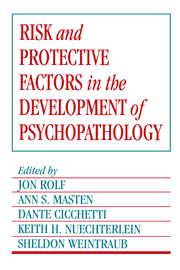Book contents
- Frontmatter
- Contents
- List of contributors
- Preface
- Part I Introduction: Historical and theoretical roots of developmental psychopathology
- Part II Contributions of the high-risk child paradigm: continuities and changes in adaptation during development
- Part III Competence under adversity: individual and family differences in resilience
- Part IV The challenge of adolescence for developmental psychopathology
- Part V Factors in the development of schizophrenia and other severe psychopathology in late adolescence and adulthood
- 18 Family relations as risk factors for the onset and course of schizophrenia
- 19 Long-range schizophrenia forecasting: many a slip twixt cup and lip
- 20 Vulnerability factors in children at risk: anomalies in attentional functioning and social behavior
- 21 Schizophrenia: a new model of its transmission and its variations
- 22 Premorbid competence and the courses and outcomes of psychiatric disorders
- 23 Relationships between adult development and the course of mental disorder
- A closing note: Reflections on the future
- Author index
- Subject index
23 - Relationships between adult development and the course of mental disorder
Published online by Cambridge University Press: 06 August 2010
- Frontmatter
- Contents
- List of contributors
- Preface
- Part I Introduction: Historical and theoretical roots of developmental psychopathology
- Part II Contributions of the high-risk child paradigm: continuities and changes in adaptation during development
- Part III Competence under adversity: individual and family differences in resilience
- Part IV The challenge of adolescence for developmental psychopathology
- Part V Factors in the development of schizophrenia and other severe psychopathology in late adolescence and adulthood
- 18 Family relations as risk factors for the onset and course of schizophrenia
- 19 Long-range schizophrenia forecasting: many a slip twixt cup and lip
- 20 Vulnerability factors in children at risk: anomalies in attentional functioning and social behavior
- 21 Schizophrenia: a new model of its transmission and its variations
- 22 Premorbid competence and the courses and outcomes of psychiatric disorders
- 23 Relationships between adult development and the course of mental disorder
- A closing note: Reflections on the future
- Author index
- Subject index
Summary
Are adult development and the course of mental disorder related to each other in major ways, or are they mutually irrelevant? Polar opposite views have dominated this issue. From the beginning of modern psychiatry in the nineteenth century, two major theories of the course of mental disorders, the psychoanalytic and the natural history theories, have upheld opposite extremes. The natural history view has suggested that any mental disorder, like any other type of disease, has a natural history, so that developmental considerations are essentially irrelevant to course. In fact, this model states that a disorder or disease process is defined by its course, and that course is what establishes the disease as a diagnostic entity. Thus, for example, in describing dementia praecox – later called the group of schizophrenias by Bleuler (1911/ 1950) – Kraepelin brought together three rather different syndromes under one diagnostic entity because he believed that they each had a deteriorating course and outcome (Kraepelin, 1902).
In contrast to that approach, the psychoanalytic orientation has suggested that the course of a mental disorder is intimately tied to psychological developmental mechanisms. In this view, the course of a psychosis, for example, has been perceived as the result of the degree to which id, ego, and superego pressures and mechanisms can be reconciled, which in turn is a function of their developmentally influenced strengths and patterns of functioning (Freud, 1924).
In this chapter we shall review briefly some recent major trends in understanding the course of mental disorders and adult aspects of development suggesting that these two domains are neither identical nor totally unrelated.
- Type
- Chapter
- Information
- Publisher: Cambridge University PressPrint publication year: 1990
- 1
- Cited by



